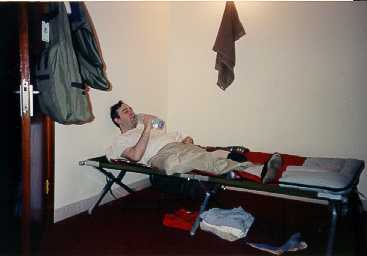
Saudi Arabia
It was a rather melancholy 39th birthday on April 2, 1991 and I wasn’t in the mood for working that day. We were in Saudi Arabia now for about a month and I hadn’t had a day off since our arrival. What the heck, it’s my birthday and I was lonely, so I decided to take some time out and write a letter to "the folks back home." The following account is drawn from that letter. The story begins on March 3, 1991, with our "basic training" at the Aberdeen Proving Grounds in Maryland…
Basic Training
It started out pretty good. From our arrival at Aberdeen Proving Grounds, until the minute MTMC (The Military Traffic Management Command) regained control of our lives, everything was highly organized and extremely well managed. Immediately upon checking in to the guesthouse, we received a detailed schedule of our training that was faithfully followed. The POR (Processing for Overseas Replacement) was orchestrated to the second and proceeded with remarkable smoothness – something absolutely amazing to a second generation MTMC employee, used to a normally confused state of affairs.
We had cable TV in the guest house and the last movie watched there, which turned out to be the last TV I will have seen until my return to "the world", was Full Metal Jacket, a sober account of a group or Marines from boot camp to Vietnam. Little did I know then that this was to be a portent of things to come.
The first day in Aberdeen consisted of lectures on all sorts of protocol, health issues and safety tips. The most amusing lecture, concerning sexual mores in the Mid-East, combined all of these themes. We were instructed that under no circumstances were we to approach Arab women, look at them, talk to them, etc. Concerning American women in the country, the same restrictions were imposed. We were prohibited by Saudi law to engage in any sexual activities with anyone, anywhere, at any time - but if you do, use a condom!
Our introduction to the rigors of life as a "Combat Programmer" came on the second day with our passage to the dreaded "back room of the gym". Here stood a smiling medic who was to utter the greatest understatement since Sadam said "...Relax, it ain’t gonna start today." The medic smiled, looked me straight in the eye and said, "Don’t worry sir, this won’t hurt a bit!"
Two shots in the left arm, three in the right – and then the coup-de-gras – the "Tush Torpedo!" Now picture this, a short while later, myself and about fifty otherwise healthy, eager Saudi-bound gentlemen, were congregated in a waiting room in the Dental clinic where we were to have Dental x-rays taken for identification. The room had plenty of plush seats for everybody – and not one of us could sit down. Mercifully, the pain in the butt soon faded into a fond memory, but the best was yet to come…
That night, my arms were gripped by a pain that made the four broken ribs I suffered in an auto accident two years before feel like an itch. The only thing that kept me from going insane were sweet thoughts of revenge on the MTMC folks that put me in this predicament. Later, I made an abortive attempt to alleviate the pain a bit. I put two Tylenols in my right hand and a glass of water in my left and that’s as far as I could go. I literally could not raise my hand high enough to get the pills in my mouth! At least we could look forward to tomorrow when our schedule showed the morning off and a pleasant afternoon of gas mask training… yeah, right!
You know, after two days of schedules met, promises kept and general orderliness, a fellow gets used to the proper way of doing things. That all ended with one phone call. "You’re scheduled on a flight leaving Dover (Air Force Base), Thursday night. You’ll meet up with the rest of your party tomorrow morning and proceed with them…" Next day we waited, we watched, we wondered, but of course, nobody showed up.
That afternoon we received our next set of instructions – "…OK, don’t worry, - get them to rush you through the rest of the training and we’ll tell you where to report". Two diligent soldiers followed orders and pulled strings to rush the training process. Much to the chagrin of the Aberdeen authorities, we rapidly finished the processing. Now armed with all sorts of chemical protective suits, helmets, gas masks and other necessities of desert life, we sat down to await our next set of urgent instructions. My father learned the expression "hurry up and wait" during World War II, well, it’s 50 years later dad, and nothing has changed. We sat on our duffel bags for over twelve hours.
"Well, I guess you all should come on down here to Headquarters and we’ll take it from here." Why not? Wednesday, 2:00PM finds us rolling into Bailey’s Crossroads, Virginia - the Bermuda Triangle of Defense Transportation. Normal people enter but….
Our sojourn in Sleepy Hollow did have one good effect. We got a third-hand report that bedding might not be available "in country" so Steve Stoner, my co-worker and I found a K-Mart and bought two sleeping bags. That turned out to be one of the wisest purchases I’ve ever made. Right now, that sleeping bag is the only thing protecting my normally pampered civilian bones from the "untender" mercies of an Army cot. That inch of polyester is the only pleasure I’ve experienced in this, you’ll excuse the expression, country.

Our day in Virginia consisted of, well, nothing. After hanging around with our thumbs, er, you know where, we finally found out that we were booked on a C-141 cargo flight leaving Dover AFB. Yes, that’s where they used to bring the bodies back from Vietnam – you think they're trying to tell us something? Maybe I better cut out the Headquarters jokes! We got a lift to Fort Belvoir where we joined eight other condemnees from the TCACCIS (a installation level transportation system) Project Management Office and the UNISYS Corporation. At 1700 hours Thursday, we boarded a bus, got handshakes and best wishes from the TCACCIS Colonel, teary good-byes from friends and relatives and rode off to war…
The Flight
Not five minutes into the trip, a consensus developed amongst the "Ten Horsemen" that there was no way we could leave our lives and country – at least not sober. We told the bus driver to pull over at a deli and hastily procured two cases of Milwaukee’s Finest. We arrived at Dover in the only condition a reasonable person could depart for Saudi Arabia – stewed to the gills!
We’ve all endured aggravating rides on crowded city busses, endless commutes through traffic jams, subway rides to nowhere or the endless car trip with "the family". All of these are pleasures compared to a flight on a MAC cargo aircraft. The C-141 is a large cargo airplane designed to hold just about anything – except passengers. You sit on a canvas bench, facing inward along the sides of the ship. This position presents no problem with regard to sightseeing because there are no windows to look out of. You are forced to wear earplugs because the noise is unbearable, as is everything else about the flight. Your back has no support save a nylon cargo net, you have no place to put your feet up, the pain starts after the first hour and there are seventeen more to go.
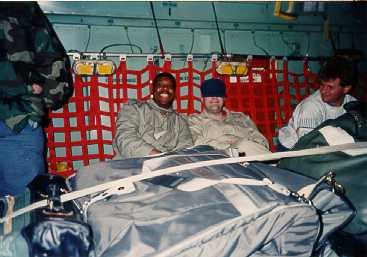
No possibility of passing the time sleeping, even if I could find a comfortable position, I developed a kind of affliction that caused insomnia throughout the entire flight – Steve Stoner. My war buddy had a number of ways to "thank" me for being the one who had to order him to get into this mess, [see the "immunoglobulin incident" below] one of them was to give me a poke in the ribs whenever I fell asleep. I put up with his annoyance because I felt that I owed him the opportunity for a little revenge, and also because I remember reading some obscure Civil Service regulation prohibiting a supervisor from assaulting an employee. I didn’t have the heart to get him back when he fell asleep because I really like the guy, besides, he’s bigger than me.
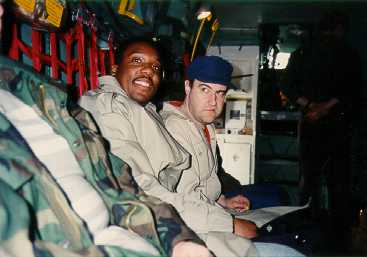
(Below, Torrejon Spain)
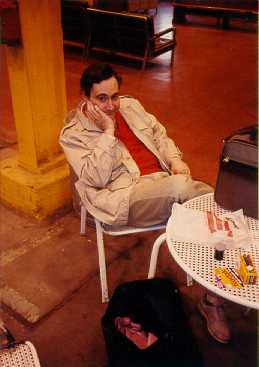
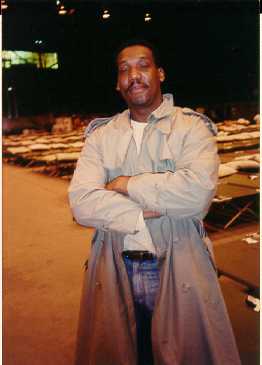
Then there’s the "meal". Our airborne cuisine consisted of a white box filled with various unidentifiable foodstuffs that ultimately sent one third of our group on the fast lane to the latrine. My bout with "the runs" occurred just as we were landing in Saudi – the precise moment that FAA and Military regulations prohibit you from leaving your seat. More pain – it’s second nature by now. After an initial eight hours of flight, we stopped over in Torrejon, Spain, where I made another wise purchase, two towels which are the only ones I’ve seen here. Two hours or so in Spain were followed by another eight hours in the flying dungeon. More pokes in the ribs by Steve, another white box full of poison and then we arrived. Kid, you think the flight was bad - you ain’t seen nothin’ yet – you’re in Saudi Arabia.
We’re Here
The little hatch on the C-141 is pulled open and you get your first glimpse of the Kingdom – a dusty airport tarmac. It’s all downhill from there. After a bus ride past the Jaguars and F-15’s, we were deposited at the passenger terminal, a crowded, dirty hangar, and left to fend for ourselves. No passport check, no customs, just ten guys, seven thousand miles from anywhere important, wondering how we got into this mess and how we were going to get the people that ordered us to "volunteer" for this mission.
After a bit of time it became obvious that no one was coming to meet us. Worse than that, we had no phone numbers for anyone here and couldn’t find anyone willing to help us. The Saudi Syndrome had begun – nobody knows anything about anything, and nobody can get anything accomplished. I finally cajoled some Air Force officer into letting me use a phone and got through to the MTMC Emergency Operations Center. They gave me the local phone number of the MTMC-SAUDI staff duty officer who arranged transportation for us. We deplaned at about 2:30AM and finally were on the road to our quarters after dawn.
Our "Accommodations"
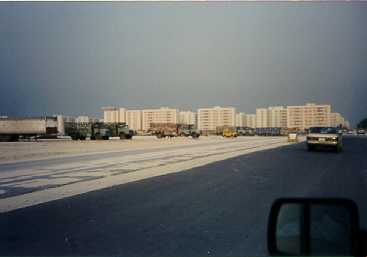
Al Khobar is a little seaside village just east of the main runway of King Abdul Aziz Air Base which is also the Dhahran International Airport. The major feature of AL Khobar is the huge Khobar Towers apartment complex [which was made famous later as the sight of a deadly terrorist bombing]. This sprawling group of four, six and eight story apartment buildings has remained fully unoccupied for many years because no self-respecting Arab would be caught dead there. Then came the U. S. Army. Khobar now housed thousands of troops who are brought in from the field, cleaned up and put on flights home.
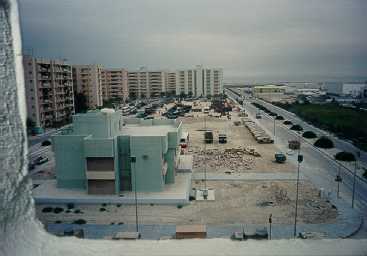
Amongst Khobar Towers’ many permanent residents are myself and my comrade in computers, Steve Stoner. We have one room of a five room, fifth floor apartment to ourselves. We share one of the bathrooms with two others and there are a total of eight in the apartment. We expect to be getting more in our "family" soon, but right now, we’re keeping our mouths shut about the fact that our apartment isn’t fully occupied. Furniture consists of a canvas Army cot – period. You see now why the sleeping bag is my most prized possession.
There is some truth to the popular story that I had a fight with a high-ranked Headquarters person over a cardboard box that I wanted to use as a night table. What actually happened was that after I unpacked it he grabbed it for himself. Understand that garbage tends to take on new meaning when you have nothing. I tried to con him into giving up the box by telling him that I saw rat excrement in the box when I unpacked it. Well, I lost the fight and he slept with the box beside his "rack" for two weeks until he left. I’m not really sorry I lost that argument though, because I actually did see rat droppings in the box! I have my own box now anyway.
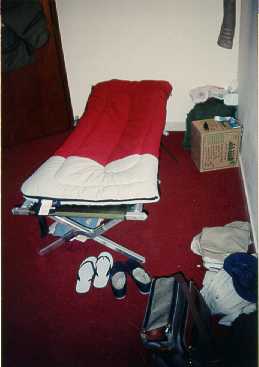
Now comes the fun part – the description of the lobby. It seems that Arabic plumbing is about as sixth-century as the rest of their psyche. Every time someone in our eight-story building flushes a toilet, that is the few that work, the first floor apartment floods with raw sewage. Although the door is well sandbagged, a considerable amount of the stuff seeps out anyway and flows into the lobby. What a wonderful way to start and end the day – a walk through human waste.
After wading through the "Perfume River," you have a short walk to the mess hall which is located in a subterranean parking garage. That wouldn’t be so bad but they have never cleaned the place. You eat on plastic plates on plywood picnic tables that are never washed. It’s amazing how quickly you get used to certain things. A flea hops across my bread and I just keep on eating – extra protein. The food, what I can eat of it, is reasonably good. At least I haven’t been sick yet. A slightly more varied menu is available at the Air Base in a clean mess hall, but once you get used to filth as a way of life, the convenience of Chez Concrete is the best reason to eat there.
It seems to me that the national motto of Saudi Arabia is "Where there’s filth, there’s life." We all seemed to have the impression that Saudi was a sandy desert – it’s actually nothing but dust and rocks. Dust is everywhere and it gets into everything. Being here is like living inside a vacuum cleaner bag. You take a shower and fifteen minutes later you feel dusty. Your clothes get dirty the minute you put them on, so I don’t bother washing them. Again, human resiliency triumphs, after a while, the whole dirtiness thing just feels normal.
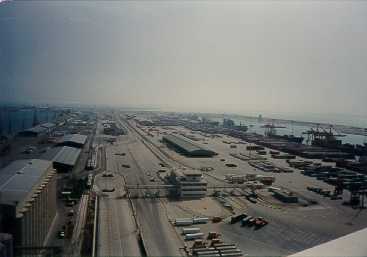
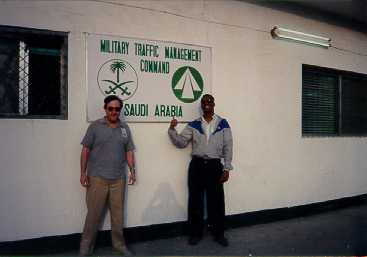
Dhahran sits in the middle of a bump of land that extends into the Persian Gulf. Khobar, our dusty bedroom community, is just to the east of Dhahran on the Gulf Coast. About twenty miles north, on the top of the bump, is the seaport of Ad Dammam. King Abdul Aziz port is a major shipping center and is quite busy offloading all the riches of the world that petrodollars can buy. Next to another overflowing, open sewer, is the one-story, white building that houses MTMC-SA. My place of business is a mobile home beside the main building which, thank goodness, has a functioning air-conditioner – that is when the portable generator is running. It’s amazing how much I’ve accomplished since coming here because work and sleep are the only things that keep your mind off the misery of living here. There simply is no other entertainment available short of watching the antics of my partner, Steve.
Steve
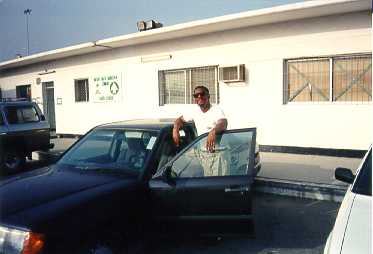
I think if it weren’t for Steve Stoner, I would probably have assaulted someone by now. We seem to get our bouts with anger and frustration at different times so that one of us is always in a position to calm the other one down. Steve has become my personal supply sergeant, he always seems to be able to go and say the right thing to the right person and get us what we need. If it weren’t for him, we wouldn’t have a roll of toilet paper – that’s how well they take care of you here.
The typical evening consists of enduring Steve while he preens and shows off his muscles during his pre-run warm-up. This is followed by the blessed half-hour when he is actually out running – just enough time to recover before his return. The two hours after his run are filled with ravings about "…Man, that was one of the best runs I ever had!" I’m not the only one who had the distinct honor of hearing his incessant descriptions of the pleasures of running and exercise. Steve always opens up the double doors to the adjacent room to ensure he simultaneously annoys the two hapless soldiers living there. Luckily, Steve always seems to come down from his runner’s high just before one of us is about to assault him.
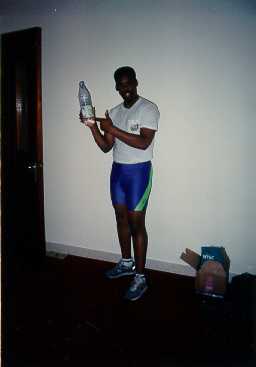
There is, of course, the famous immunoglobulin incident. Just after getting our "rear area" shots at Aberdeen, Steve decided there was no time like the present to get his revenge on me for getting him into this mess. About fifteen minutes after getting "the big one", Steve said, "Hi Mike, how are you feeling?" and grabbed me by the buttocks - or I should say, THE buttock. After hitting the fifty-foot ceiling of the gym, I completely forgot all my supervisory training about violence in the workplace, and proceeded to try my best to murder one of my employees. Only now can I appreciate the humor of the situation, it will be funnier still when I fill out Steve’s performance rating.
Sightseeing
The trip between Dammam and Khobar takes us past some of the most famous sights of the Gulf War. We pass the site of the warehouse where all those soldiers were killed after a direct hit by a Scud. The warehouse was torn down just after we arrived. The Patriot batteries, which defended Dhahran air base, are located just in front of our housing complex. In a shallow tidal area next to the highway leading to the port, we show all the newly arrived people the carcass of one of the Scud missiles that was reported as having "fallen harmlessly into the Persian Gulf." We string them along for a few days and, after they snap a few pictures, we reveal it to be what it actually is, the remains of a small boat.
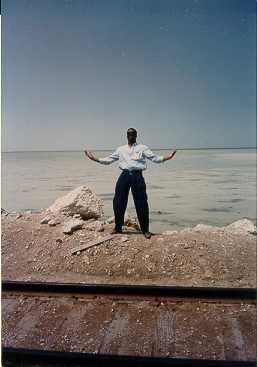
If we go to the air base for a meal, we pass the Dhahran International Hotel, where all the news broadcasters had their stages set up. I still don’t know what the blue domes are because we never got around to having our pictures taken on one of the stages, but the flashing lights you always saw behind Dan Rather are anti-collision strobes on top of the light stantions of the King Fahad University stadium. Those news people really had it tough, the stages are two steps from the pool (I think the blue domes were the cabanas) and two steps from the bar.
Them
[Another warning here, my own bias will be evident in what you are about to read. Please understand that it was tough to be over there, bailing out a country, all the while reading anti-Jewish and anti-Israel propaganda in their English language newspapers. It bothered me then, and still bothers me today. What you are about to read isn’t exactly politically correct but I prefer to leave it as I wrote it in 1991.]
It’s interesting how little you actually see of the Saudis themselves. Outsiders seem to do everything here (including fighting their wars). Indians, Pakistanis and other non-Saudis do all the work, but the Saudis have all the top managerial positions. The only time you ever actually see them is on the highway where Abou Ibn Oilwell zooms by in his Mercedes at 150 miles per hour, his "rag and fanbelt" headdress blowing in the breeze. At prayer time though, wherever they are they pull over, lay their rug in the dirt and do their thing. The fact that the Arabs consider this dust bowl holy ground really tells you something about them.
We have never experienced any situations that could be construed as putting us in physical danger – at least not from the war. Terrorism is always on our minds, but our biggest fear comes whenever we have to drive anywhere. There is no "weapon of mass destruction" that Sadam could have used against the Saudis that could have killed as many people as automobiles kill each day. I honestly believe that the Islamic Clerics should add a fifth tenet to their religion – "Thou shalt stay out of automobiles!" The Saudis and their guest workers are simply the world’s craziest drivers. When they’re not driving at supersonic speeds, they’re cutting sideways across three lanes of traffic to get off at an exit. The average Arab driver cannot stand to be behind anyone – he (she’s are not allowed to drive) will jump curbs, cross medians, do anything possible to get ahead of the vehicle in front of him. Arab driving skill is clearly reflected in their highway fatality rates. Fatal accidents occurred almost every day we were here, and the highways are lined with wrecked vehicles which are mangled beyond recognition.
Us
I’m writing this account on my birthday, Tuesday, April 2, 1991. The weather has changed considerably from when we arrived in early March. At first, the prevailing winds were out of the north which brought all the smoke from Kuwait oil well fires over us. It always looked like a thunderstorm was on the horizon but that really was the smoke. It was cool and damp and we got an occasional sprinkle. Now the winds are coming from the south and the hot weather is starting. When I was in Rotterdam, a scant four months ago, the sun barely rose above the horizon, even at midday. Here, the sun is almost directly overhead. We have already gotten into the 90’s and the veterans say, "wait till it really gets hot!".
Some further snippets of life here in the war zone. The members of the 82nd Airborne Division, with whom I have the honor of sharing a mess table, have taken to trading pictures of dead bodies. "I’ll trade you two arms and a leg for a torso." I hear some guy was busted trying to carry home an arm in his duffel. The soldiers have been aptly described as "children with guns". They are very young but they come out of the desert subdued and somewhat grim. After a few days, however, they unwind and become quite spirited. Its good that they are going home, I’m glad we’re helping out with that.
Khobar Towers is well guarded and frequently patrolled. I make sure that I carry my ID on my person constantly, the weapons and ammunition carried by the sentries are quite real and I have no uniform or other means to distinguish myself as an American. I feel a bit of pride as I pass the Bradley Fighting Vehicle just behind the car maze at the main gate. It bears a cannon ready to deal with anyone crazy enough to try to run the gate, and a barcode label and stenciled Transportation Control Number which are generated by the systems I work on.
There is another reason however, that guards posted at every gate at Khobar Towers. It's not so much to keep intruders out - but to ensure that American female joggers, dressed in tank tops and shorts, don't stray into Saudi areas where they can be arrested for indecent exposure!
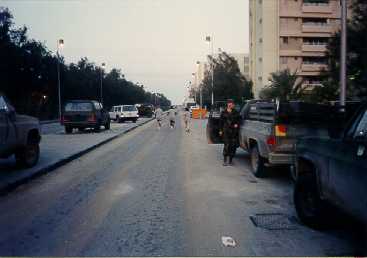
The standard greeting around here has become, "Who’d you piss off to wind up here?" Another favorite pleasantry is "It’s a beautiful day in the Kingdom!" This is usually uttered as we walk to work and inhale the scent emanating from the open sewer. We always answer, "Everyday is a beautiful day in the Kingdom!"
Beyond my earlier comments about the Saudi Syndrome, I think it is best not to dwell on the way we are being treated here. I don’t feel I will come away from this experience with anything really beneficial but, should I ever be in a position of authority and be in charge of arrangements for guests, I will think of my experience here and know what not to do.
If we are vexed by the fact that we are ignored by the MTMC-SAUDI staff, we are double annoyed by the continual attention of the "National Bird of Saudi Arabia." The Saudi fly is your constant companion, he will get into your eyes, ears, mouth and anywhere he feels he can find a meal. The only defense against them is to simply get used to them – that’s the only way they won’t bother you. Luckily, the mosquitoes haven’t come out of hibernation yet.
Me
I guess I have to say that the high point of my stay here was the time I had my picture taken in a captured Iraqi Hind helicopter. You know, that’s the type of chopper that Rambo shot down -although he wouldn't have if I were at the controls. The low point was basically the rest of my stay. My 1991 account of the Saudi trip ended here, but there was to be much more to the story. Little did I know at that point, that the world I left behind would cease to exist for my return.
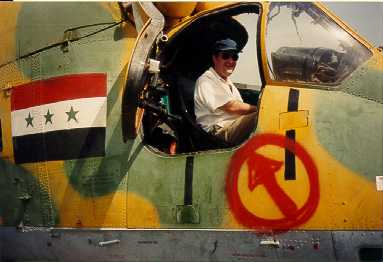
I was very proud of the work I did there however. No system for the redeployment of unit cargo existed at the time and I basically used my knowledge of the subject matter to design and write a system consisting of some thirty programs. It would accomplish the documentation required for the redeployment mission, soon to be called Operation Desert Sortie, and provide information for transportation planners in various formats.
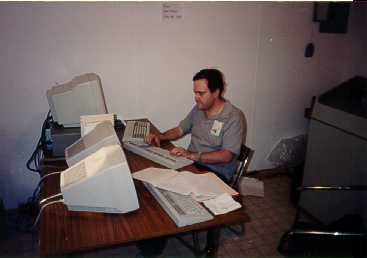
My work in Saudi Arabia continued as the Jewish Holiday of Passover approached. One of my favorite war-stories from my father was when he in the Netherlands East Indies on the island of Biak and was blockaded by the Japanese for a year. They existed on whatever rations that could be flown in until Admiral Nimitz broke the blockade just before Passover. The Jewish troops had nothing in the way of Passover food and weren’t looking forward to being able to celebrate the holiday. My father said that a minor miracle happened that day on the eve of Passover. The first supply ship that unloaded after the blockade was broken contained a shipment of Passover food, thereby allowing the garrison’s Jewish soldiers to celebrate their holiday.
For me, no miracle occurred during Passover of 1991. I had neither motza (unleavened bread) nor wine, nor could I find out if or where services or a Seder (the Passover ritual meal) would be held. True, there were services held and these items were available, but communications were so poor (remember, the Saudi Syndrome) that I was unable to make contact with a chaplain of any faith. I smuggled a pair of Tephillin (Phylacteries, Jewish religious articles) and a siddur (prayerbook) into the country, amongst the very few that have ever been in Saudi Arabia, and had at least that to comfort me. I had no premonition, no feeling of impending doom, I just missed my family and my life back home and was really depressed throughout the holiday. I existed for eight days on powdered eggs and potatoes, the only semblance of Passover food I could muster.
My dear friend Steve Stoner left for home just after I wrote the letter that spawned this account. I couldn't see him suffering in that place any longer than necessary and had been begging him to go home for several weeks. He didn't want to leave me there alone and stayed on until we both witnessed another horrible accident where two Warrant Officers we had been working with were killed in a collision with a truck - days before their departure. Steve looked at me and said, "You're right, I've got to get out of here, this place isn't safe." He started the transportation arrangements that afternoon. Simply put, Steve Stoner is the finest human being I've ever had the privilege of knowing. I regret that I had to be the one to put him through this experience and the difficulties he also experienced after his return, but like me, he emerged from this stronger, happier and generally better than he was before - I'll value his friendship forever.
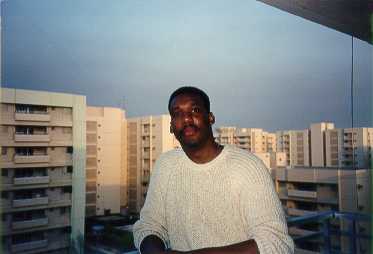
On the way home Steve phoned the office and found out that they had been trying to get in touch with me because my mother had been hospitalized with terminal cancer and her doctors were requesting my presence to aid in her recovery. It took them 4 more days to reach me with that news and another week to arrange transportation out of there. My Saudi TDY (Temporary Duty) ended where it began, on the dusty tarmac of Dhahran Airport. After spending a night sitting on my duffel bag in the dirt, at 0400 I boarded the flight home on 15 April 1991.
There is one powerful image that will remain with me forever and which ultimately changed - or rather, restored - my life. Nearly every window in every building we were in was taped up to keep it from shattering from explosions. Three tapes were placed on each window, two in the shape of an "X" and one horizontally. You'll have to draw a sketch of this to visualize what I'm saying, however at the confluence of these strips of tape, there appeared a six-pointed Star of David. The image had a different meaning to me in 1991, it meant that as usual, whenever and wherever the Armed Forces of the United States meets an enemy, there are included in their ranks a large number of people of the Jewish faith. I had a lot of hate in me then and I enjoyed the thought that, according to Jewish War Veterans estimates, myself and some five thousand people of Jewish background were urinating and defecating on that country daily. Today, the image of those Stars of David in every Saudi Arabian window has a completely different meaning. Freed now from the bondage of mindless hate, I see it as proof ancient teachings of my religion, that though I felt abandoned and alone in a "G-d forsaken" place, no place on Earth is G-d forsaken - and no person, least of all myself, is abandoned by H-shem. That image was one of the sparks that kindled the religious rebirth I experienced in the years since the Gulf War that helped me return to a happy and fulfilling life. Now in 1998, I finally feel that I've returned home. But it was a long trip back.
| Previous Chapter | Contents | Next Chapter |